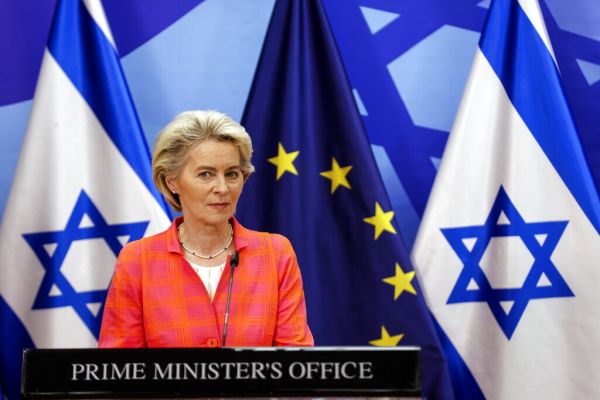Israel sits on an estimated 1,000 billion cubic meters of offshore natural gas, but does not have the means to deliver it to Europe.
By Pesach Benson, United with Israel
Israeli natural gas exports can play a key role in helping Europe defeat Russia’s energy “blackmail,” said European Commission chief Ursula von der Leyen on Tuesday.
Von der Leyen is on the last day of a two-day visit for talks with Israeli and Palestinian officials. Her agenda includes two immediately pressing issues for Europe: breaking the continent’s dependency on Russian gas, and the global food crisis brought on by the war in Ukraine.
“The Kremlin has used our dependency on Russian fossil fuels to blackmail us,” said von der Leyen at Ben-Gurion University in Beersheba, where she was given an honorary doctorate.
“Since the beginning of the war, Russia has deliberately cut off its gas supplies to Poland, Bulgaria and Finland, and Dutch and Danish companies, in retaliation for our support to Ukraine, she said.
But Moscow pressure tactics “only strengthens our resolve to break free of our dependence on Russian fossil fuels,” von der Leyen stressed.
“Europe and Israel are bound to be friends and allies,” said von der Leyen. “Because the history of Europe is the history of the Jewish people. The strongest bond we share is our belief in democracy and in democratic values.”
She stressed that Russia’s invasion of Ukraine was an assault on democracy before turning her attention to Israeli-European energy cooperation.
The EU, von der Leyen said, is “exploring ways to step up our energy cooperation with Israel,” with work on an underwater power cable and a gas pipeline in the eastern Mediterranean, calling it “an investment in both Europe’s and Israel’s energy security.”
She was referring to the EastMed pipeline, an ambitious project by Israel, Cyprus and Greece to lay a new pipeline across the Mediterranean. The initiative was undercut when the Biden administration dropped U.S support in January, calling it politically “destabilizing” and questioning its economic and environmental viability.
Israel is sitting on an estimated 1,000 billion cubic meters of offshore natural gas, but does not have the means to deliver it to Europe.
Israeli Energy Minister Karine Elharrar has been exploring options to send its gas to Egypt’s liquefied natural gas terminal near Alexandria, where it would be processed and sent on to Europe by ship. Turkey is also courting Israeli cooperation to sell gas to Europe.
Food shortages stemming from the war in Ukraine were also on the agenda for von der Leyen’s meetings in Jerusalem and Ramallah.
Prior to Russia’s invasion, Ukraine provided 10 percent of the world’s wheat. Moreover, 60% of Israel’s wheat was imported from Ukraine or Russia.
According to Oxfam, a British non-governmental organization, the Palestinian Authority imports 95% of its wheat, “but it owns no food storage infrastructure so is forced to rely instead on the Palestinian private sector and Israel’s facilities.”
Von der Leyen’s speech also acknowledge Europe’s rising antisemitism.
“European Jewish life is…embattled and endangered. Antisemitism has not disappeared. It still poisons our societies. And antisemitic attacks happen, today, in Europe. It is a new threat and it is the same old evil. Every new generation must take responsibility so that the past does not return,” she said.
Do You Love Israel? Make a Donation - Show Your Support!
Donate to vital charities that help protect Israeli citizens and inspire millions around the world to support Israel too!
Now more than ever, Israel needs your help to fight and win the war -- including on the battlefield of public opinion.
Antisemitism, anti-Israel bias and boycotts are out of control. Israel's enemies are inciting terror and violence against innocent Israelis and Jews around the world. Help us fight back!



